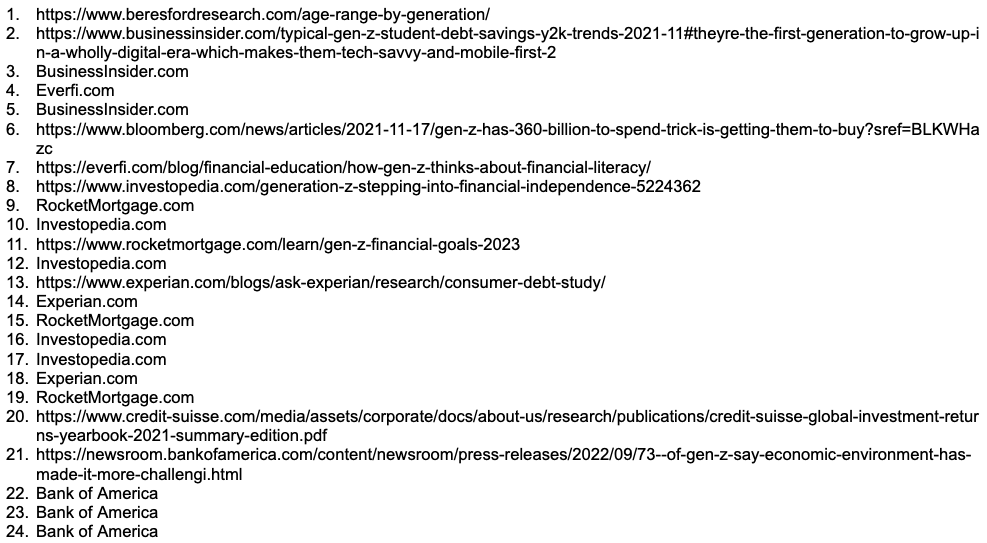Gen Z is defined as those born between 1997 and 2013 [1], and are generally known as the “computer generation,” as they are the first generation in the US to not know a time before the internet. The average age a Gen Z individual gets their first smartphone is 12 [2].
For those of us who are a bit older, let that sink in. Gen Z's don’t know what the world was like before home computers and easy internet. As a result, by some estimates Gen Z spends 6 hours a day on just their phones – not counting what time they spend on other screens. Despite what criticisms may come their way, Gen Z’s still have a seat at the table, and they’ve taken their lumps. According to the World Bank, Gen Z lost $10 Trillion in potential earnings from COVID (factoring in how those earnings could have turned into investments, savings, etc.) [3].General Statistics
- Over 65% of teens already have a bank account [4].
- 38% of Gen Z’s have opened an investment account since the COVID lockdowns [5].
- Gen Z, as seen above, doesn’t like consumer debt and are worried about the tax debt that landed previous generations in the news. Which is why a whopping 39.5% are trying to meet their goals by finding better paying jobs.
- Specific investment knowledge remains out of reach of Gen Z’s, with 28.1% feeling they don’t know enough about stocks, and 20.3% lacking information about retirement.
- Knowledge and resources notwithstanding, 51% of Gen Z have an active budget. Here’s how many Gen Z’s budget for each category:
- 80% are on a food budget
- 65% on a rent/housing budget
- 54% track their utilities
- 50% budget for transportation, and
- 48% keep a lid on entertainment
Gen Z Monthly Budget
Below is a breakdown of how much of their income the average Gen Z spends on each category and how much full-time Gen Z workers pay of their income. The last column is how each category compares; for instance, part-time workers only pay about 60% the rent that full-time workers pay, while both groups pay the same amount for Entertainment, every month.
Category | Percent of Average Gen Z Total Income | Percent of Full-Time Gen Z Earner's Income | Percent Average Gen Z Pays vs Full-Time Gen Z |
|---|---|---|---|
Housing | 38.04% | 43.91% | 60.02% |
Savings | 11.12% | 16.48% | 46.74% |
Credit Cards | 11.12% | 9.90% | 77.83% |
Food | 11.12% | 9.90% | 77.83% |
Entertainment | 11.12% | 7.70% | 100% |
Transportation | 9.53% | 6.61% | 100% |
Utilities | 7.95% | 5.51% | 100% |
From this data we can see that while full-time workers in Gen Z pay more of their income to housing, they’re also saving more of their income and paying less of it to credit card debt. Additionally, because both groups are paying about the same per month on Entertainment, Transportation, and Utilities, we can see that it’s a far higher percentage of part-time worker’s income.
Incomes and budgets aside, the aggregate numbers for Gen Z are also telling. According to Bloomberg, Gen Z has a total of $360 Billion in disposable income [6].
Financial Literacy
Many experts look to financial literacy as a forecaster of financial success and habits. While many of these data come from self-reported surveys, some information comes from actual literacy tests, such as asking Gen Z’s how their credit scores are calculated.
- Compared to the generation before them, Gen Zers are 3 times more likely to have undergone formal financial education [7].
- Despite this, 84% still rely on family for advice and information about finances.
- And according to Investopedia, only 46% of them feel good about their knowledge of finance.
- Despite being “better educated,” that’s 15% lower than Millennials, of whom 61% are confident in their knowledge. (For comparison, 54% and 52% of Gen X and Boomers are similarly confident.)
- Up to 56% of teens don’t know how a credit score is calculated.
- Only 31% of Gen Z adults feel “confident” enough about how stocks work to explain it to someone [8].
- In the same survey, the number one skill Gen Z wants to learn? How to pay taxes. 37% of all earners under $50,000 wanted to know how to do their taxes on their own.
- According to another poll, 38.4% of Gen Z doesn’t feel they have the information or confidence to own a home [9].
Much of the financial literacy divide comes down to economic background and earning power: 57% of Gen Zers making more than $50,000 are “confident” in their knowledge about finances; only 39% of people making less than that feel the same. It’s also important to contextualize where Gen Z is getting their financial “information.” The quotes are to indicate irony, as the number one source of finance knowledge for young adults is YouTube, and TikTok edges out actual financial websites.
Sources of Financial Information, by percent of Gen Zers who look there:
- YouTube – 45%
- Friends or Family – 44%
- Internet (general) – 39%
- TikTok – 30%
- Financial websites – 29%
Savings
Savings are incredibly important to Gen Z adults–they’re debt-averse, and only 19% think they’ll have any form of Social Security [10].
- 69.1% of Gen Z is actively putting money in savings [11].
- Of that 69%, 56% are saving that money specifically for homeownership.
- The other top reasons for saving among Gen Z:
- Emergency funds – 39%
- Retirement – 11.8%
- And Taxes, at 9.6%
- Bank of America reports that 73% of Gen Z’s say the economy is their biggest hurdle in saving money.
Debt and Credit
Like mentioned in the financial literacy section, many young people in Generation Z still have a lot to learn. For instance, over 30% of them feel like they don’t really understand borrowing money and managing debt [12].
This lack of understanding, and Gen Z’s debt-aversion, are well founded. Gen Z saw the largest increase in total average debt in 2022, with an increase of over 24% in total debt [13] – that’s almost 10% more than the next highest increase, Millennials at 14.7%.
Top Debt Owed by Gen Z [14]
Type | Amount | Percent Increase over 2021 |
|---|---|---|
Mortgage Loan | $217,700 | 13.3 |
Student Loan | $20,468 | 13.1 |
Auto Loan | $19,223 | 11.5 |
Personal Loans | $7,684 | 15.4 |
Credit Cards | $28,854 | 25.1 |
Some key insights we can glean from this data:
- While Gen Z has roughly half the debt in Credit Cards, Student Loans, and Auto Loans as Millennials, not all of Gen Z has become an adult yet. As they come of age, we can expect Gen Z debt to outstrip their predecessors.
- Even though the youngest Gen Z’s are still only ten years old, their auto debt is still almost the same as Boomers.
- And again, despite their average age being only 19, Gen Z already owes over 75% as much as Millennials on home loans.
Wealth and Assets
According to which survey you pull up, the numbers on Gen Z investments vary a little bit, but not by enough to change the insights we can extract. For instance, according to RocketMortgage, as high as 39.8% of all Gen Z hasn’t invested a single dime [15] – despite 42% saying they have homeownership in mind.
Top Investments (with percent of Gen Z owning that asset):
- Stocks – with 26% of all Gen Zers owning at least one stock or retirement in stocks.
- Cryptocurrency – 23%
- Mutual Funds – 12%
- NFTs – 10%
- Options and Index Funds – 8% each
- Exchange-Traded Funds and Real Estate Investment Trusts – 7% each
- Commodities – 5%
- “Other” – 2 %
Worth noting is the conventional wisdom that investments such as mutual funds, REITs and ETFs were probably setup by family. Coupled with the idea that the majority of stocks may be held as part of retirement packages, it’s clear that the two favorite discretionary investments for Gen Z are crypto and NFTs.
Some other quick stats for Gen Z in the market:
- 26% of Gen Zers over 18 are already invested in stocks [16].
- Outside of only stocks, 54% of all Gen Z adults are invested in an asset.
- The breakdown still shows the gender disparities of previous generations, with 48% of women compared to 60% of men being invested.
- Among the “other assets” owned? 25% of Gen Zers own Crypto, and 10% own NFTs. Both of these percentages are double in men what they are in women.
- As a small note back to financial literacy, 44% of Gen Z adults who aren’t invested say it’s because they don’t know how. (See table below for Top 6 Reasons).
- And back to the wealth-gap, 45% of Gen Zers earning less than $50,000 are invested–compared to 73% of those making more than that [17].
- Some good news on home ownership, based on total mortgages owed, Gen Z has increased their assets in real estate by roughly 13% [18].
- By survey numbers, however, this number is higher – 29% of Gen Z adults say they’ve either formally began or finished the homeownership process in 2022 [19].
Top 6 Reasons Gen Z isn’t Invested
- Don’t Know How – 44%
- Don’t Have Enough Money – 33%
- Fear of Losing Money – 32%
- Lack of Trust in Market – 22%
- No One I Know Invests – 12%
- Not Necessary – 11%
Despite all the investments, earnings, and diversity of portfolio, Credit Suisse [20], a world leader in financial forecasts Gen Z will only earn 2% on their investment portfolios. That’s far below half of what all other generations will earn.
Forecasting the Future
According to Business Insider, the forecast for Gen Z still looks pretty good. Citing research from Bank of America, they project:
- Gen Z earns about $7 Trillion a year.
- By 2025 that will grow to $17 Trillion.
- And by 2030, Gen Z will earn $33 Trillion, or 27% of the entire world’s income.
- That’s in large part due to 75% of Gen Z’s looking for side-hustles [21]. Ways to earn more money include:
- 34% changing jobs
- 31% following their “passions”
- 25% seeking a second employment, and
- 23% biting the bullet on jobs they hate.
The biggest challenges Gen Z’s see in their future, by percent of respondents, are [22]:
- Inflation – 59%
- Debt – 43%
- Stress – 56%
- Rent Increases – 16%
Top Goals for Gen Z’s Going Forward [23]
- Education – 40%
- Career Advancement – 32%
- New Job – 31%
- Retirement Savings – 25%
- Traveling – 24%
- Owning a Car – 22%
- Improving Credit Scores – 20%
To meet these goals, and satisfy others, 45% of Gen Z’s want to increase their material purchasing power. And 56% of them think discipline is the key success, followed by only 37% citing financial knowledge, and only 20% saying that saving money is the answer [24].
Conclusion
There’s a wealth of data available on Gen Z’s, partly owing to how internet savvy young adults are. They know how to plug into surveys, and they are increasingly more aware of financial data points. Investors, Gen Z’s, and general consumers can use these data to inform not only perceptions, but decisions and long-term planning.
References


